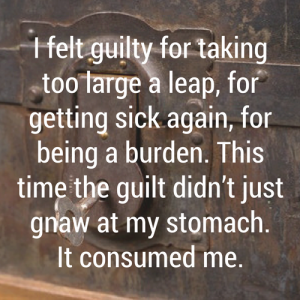by Jennifer Crystal
Patients with a chronic illness, like Lyme disease, can carry more guilt than symptoms.
The holiday season is, as the Andy Williams song goes, “the hap-happiest season of all.” While many people feel this joy, others struggle to be of good cheer. Depression and anxiety can run high during the holidays. As we reflect on the year just passed, many people wrestle with feelings of guilt.
That’s one I know well.
Patients with Lyme or any long-term illness can carry more guilt than symptoms. We feel guilty for being sick, for not getting well fast enough, for being a burden on caregivers, for not being able to work, for being dependent on others. We have guilt about our guilt, a vicious cycle that can make us want to crawl in a cave.
I experienced all of these feelings when I first got sick. I went from leading a completely independent life—teaching, ski instructing, taking care of my own needs—to being bedridden and dependent. I felt intense pressure from others and from myself to get out of bed, get well, and get back to my life. How badly I wanted to do all of those things! But with increasing symptoms and only half a diagnosis—of Epstein-Barr virus, the treatment for which was “just rest”—my ability simply didn’t match my desire.
Guilt gnawed at my stomach when people asked, “So are you thinking of getting a job?” or “When are you planning to get well?” Even a simple “What did you do today?” made me cringe because I didn’t have much to report besides “sleep” and “eat”. The implication was that my illness was something I could control, and the fact that I couldn’t will myself to get well, sent me into a tailspin. I started thinking that getting sick was all my fault. Maybe I had pushed myself too hard during those years of teaching and intense exercise. Maybe I hadn’t taken good enough care of myself. Maybe some of my symptoms were all in my head, as a few doctors suggested.
It turned out that none of that was true. My intractable illness was the fault of an insect tinier than a poppy seed, which had bitten me many years earlier and thus made it impossible for me to get over Epstein-Barr. After two bedridden years, I was finally accurately diagnosed with Lyme and other tick-borne diseases. Once I had a concrete explanation for seemingly idiopathic symptoms, many people who had pressured or not believed me laid off the guilt trips.
Laying off myself was another story. Recovery from Lyme is a long, zigzagging process. It took a year of intravenous antibiotics and intense anti-malarial medication for me to start feeling better. Guilt stayed with me on that journey. I felt bad that I wasn’t steadily getting well, that I often didn’t have the energy to do dishes or laundry or help around the house. I felt terrible that I was still so reliant on others.
When I finally was well enough to move out on my own and work part-time, I dove in head-first, wanting to escape the life of illness and prove to myself and others that I still was a motivated and capable person.
Unfortunately, the illness wasn’t escapable. Because I’d taken too large a leap, I quickly relapsed, landing right back where I’d started: bedridden, under my parents’ care, too sick to function.
I couldn’t stand it.
I felt guilty for taking too large a leap, for getting sick again, for being a burden. This time the guilt didn’t just gnaw at my stomach. It consumed me.
“You’ve got to stop this,” my stepmother said one day as I cried hysterically. “This guilt is going to block you from getting better.”
She stopped me in my tracks.
I realized in that moment that while I didn’t have control over my illnesses, I could control how I reacted to them. My therapist had been telling me this for years, reiterating that being sick was not my fault, that I was making myself worse by adding anxiety and guilt to the situation. But I didn’t really hear the message until that day at the kitchen table with my stepmom.
A physical therapist had once suggested I picture a wooden chest or trunk, and imagine myself locking all my worries inside. I didn’t have to throw them away. I could store them and take them out if I needed them, but I held the key. I got to decide when or if they came out.
Remembering that imagine, I suddenly felt like I held the key to allowing myself to get well. My guilt was still there, of course. But I acknowledged it and then locked it away, because keeping it out would only prolong my recuperation.
After I locked up my guilt, a funny thing happened. I started to get well. Not right away, of course—if only antibiotics worked overnight! But I transitioned to a calm acceptance of my situation rather than a nervous frenzy over it, and my body responded well to the shift. My symptoms abated much faster than expected.
Now that I am in remission, I still sometimes feel guilt. When I do, I ask myself if it’s over something I can change, or if it’s something that’s out of my control. If it’s the latter, I store the guilt in my wooden chest. Maybe one of these days, I’ll even throw away the key.
 Opinions expressed by contributors are their own.
Opinions expressed by contributors are their own.
Jennifer Crystal is a writer and educator in Boston. She is working on a memoir about her journey with chronic tick-borne illness. Contact her at jennifercrystalwriter@gmail.com

GLA
Admin at GLA





-2.jpg)

